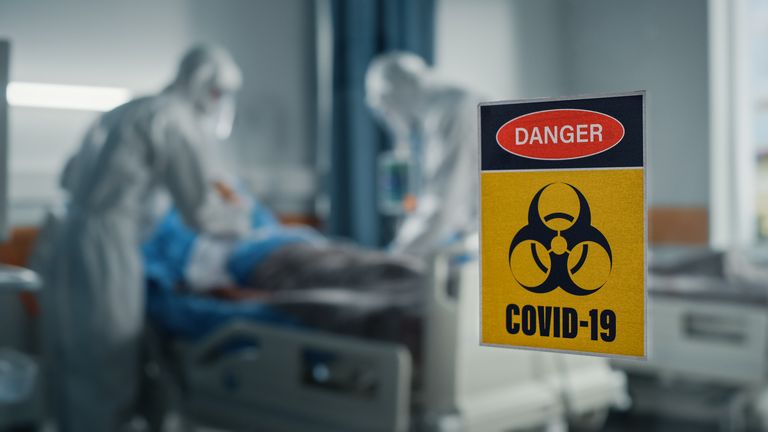[ad_1]
A healthcare worker was infected with COVID-19 twice in just 20 days – believed to be the shortest time between two infections documented since the pandemic began.
The Spanish woman, 31, became infected with the Delta variant followed by the Omicron variant of the virus in under three weeks, according to a study.
Researchers say the case shows that even vaccinated people who have had COVID-19 “cannot assume they are protected against reinfection”.
Dr Gemma Recio, of the Institut Catala de la Salut in Spain, one of the study’s authors, said it highlights the potential of the Omicron variant to evade previous immunity.
Read more:
See how your local trust is performing through the year
Case believed to be shortest known gap between infections
The female healthcare worker, who has been kept anonymous, became infected in December 2021, 12 days after she received her booster vaccine.
She had no symptoms and went into isolation for 10 days.
Just days after she returned to work in January she began to show symptoms of the virus – a cough and fever as well as feeling generally unwell – and tested positive.
Her case, which is being presented to the European Congress of Clinical Microbiology and Infectious Diseases in Portugal, is believed to be the shortest known gap between infections.
Case ‘underscores the need to carry out genomic surveillance of viruses’
Dr Recio said: “People who have had COVID-19 cannot assume they are protected against reinfection, even if they have been fully vaccinated.
“Nevertheless, both previous infection with other variants and vaccination do seem to partially protect against severe disease and hospitalisation in those with Omicron.
“This case also underscores the need to carry out genomic surveillance of viruses in infections in those who are fully vaccinated and in reinfections.
“Such monitoring will help detect variants with the ability to partially evade the immune response.”
Work by the Office for National Statistics suggests the risk of reinfection is 10 times higher with the Omicron variant compared with the Delta variant.
Omicron is now the dominant variant in most of the world.
[ad_2]
Source link










